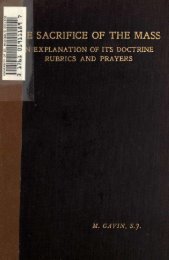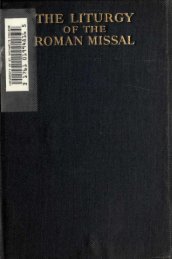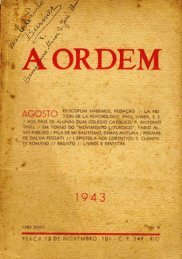E SACRIFICE OF THE MASS
E SACRIFICE OF THE MASS
E SACRIFICE OF THE MASS
Create successful ePaper yourself
Turn your PDF publications into a flip-book with our unique Google optimized e-Paper software.
APPENDIX. 191<br />
to me the point of this distinction. The Chinese<br />
of the people is a fluctuating language, comparable<br />
in this respect with the vernacular tongues of European<br />
nations. The learned Chinese, or if we may be<br />
allowed the expression, the classical Chinese, is a<br />
language of ancient origin, going back to the time of<br />
Confucius (B.C. 500), stable in its forms and in the<br />
meanings attached to them, and bearing the same<br />
relation to modern Chinese, as ancient Latin to modern<br />
Italian.<br />
It has been stated in an earlier part of this article<br />
that six different languages are at the present moment<br />
in the East sanctioned by the Holy See in the celebra<br />
tion of Mass. Not one of these languages, so I am<br />
assured by an Oriental scholar, is the vernacular of the<br />
country. To take two familiar instances. In the<br />
Russian liturgy the language is not modern Russian<br />
but Slavonic of the time of St. Cyril and St. Methodius<br />
in the ninth century. Mass in Coptic is less understood<br />
than Mass in Latin ; not only has Coptic no affinity<br />
with the Arabic spoken by the people, but many of<br />
the Coptic priests can hardly read the Coptic Missal.<br />
Here is the case of a language unintelligible not only<br />
to the people but even to the priests, still kept in the<br />
liturgy with the sanction of authority. It can hardly<br />
be asserted that the Church favours the vernacular in<br />
her liturgy.<br />
Lastly : if the Church s liturgy<br />
vernacular, where shall we end ? The people may then<br />
is to be said in the<br />
fairly claim Mass in their local dialects which may be<br />
described as their vernacular. We must have at least<br />
two liturgies in Italy and France. For the Piedmontese<br />
peasant cannot understand the language of an educated<br />
Italian, and the rustics in the South of France cannot






